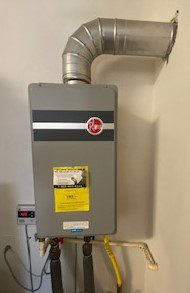 Water heaters are like many appliances, and they need to be maintained regularly to extend their life. Minerals in our hard water, as well asnormal corrosion, can shorten the life of your water heater by years without annual maintenance. Otherwise, you might be in for a rude, cold surprise!
Water heaters are like many appliances, and they need to be maintained regularly to extend their life. Minerals in our hard water, as well asnormal corrosion, can shorten the life of your water heater by years without annual maintenance. Otherwise, you might be in for a rude, cold surprise! If it has been awhile since you purchased a new water heater, the prices have gone up quite a bit. You can easily spend $500.00 to $1,000.00 for a simple, natural gas entry level small family water heater that serves up to four people.
Labor is extra and typically adds up to another $1,000.00 or more. In Southern California, earthquake strapping is necessary too. With natural gas, the services of trained, licensed plumber are needed to ensure safety during installation and that the installation will meet local fire codes.
Annual Maintenance Needs
It pays to take care of your water heater so it will take care of you for as long as possible. The average life of a gas is water heater is 8 to 12 years, but there are several things that can be done to extend their life:1. Every year, drain a few gallons of water into a bucket and see if the water has sand or debris in it. If it does, a full cleaning of the tank should be performed (usually needed every three years).2. Test the pressure relief valve regularly to verify that it is working properly. This valve is designed to prevent water pressure from causing the water tank to burst.3. Do not store equipment or boxes or flammable substances within a few feet from your water heater. The heater needs air circulation for proper, safe operation.4. If your water heater is in the garage, consider installing a bollard to protect the tank from accidental vehicle impact.5. Replace the anode rod about every five years to minimize corrosion and rusting of the tank.
Safety Concerns
Conventional water tank safety issues that need to be addressed are seismic strapping, fire safety, and service pipe leaks. Seismic strapping is a newer Building Code requirement to ensure that the water heater will not tip over during an earthquake.
This requirement ensures that the gas and water lines that service the heater are not damaged during seismic shaking, thus preventing the secondary damage following an earthquake caused by fire or flooding. When installing a new water heater in older homes, you will find that earthquake strapping has never been installed, but it is now required for replacement units.
If your pilot light fails, you should contact a plumber to re-start the pilot light or replace the thermocouple. Water pipes that service water heaters can fail, causing water damage to surrounding structural elements and can cause foundation and soil movement.
Tankless or “On-Demand” Water Heaters
Tankless electric water heaters are generally wall-mounted and take up a lot less space than traditional water heaters. Although they are generally more expensive, the expected life of a tankless heater is 20 years, compared to an average of 10 years for traditional water heaters.
They use about 25 percent of the energy used by traditional natural gas heaters. Another advantage is you will not run out of hot water during periods of peak demand. In addition, they are generally considered to be “green friendly” to the environment because they do not rely on natural gas and are compatible with home solar electric service.
Tankless electric water heaters are not maintenance free. Their heating elements are subject to the minerals in our hard water, and the heating element’s efficiency is affected by scale corrosion as well. It is recommended that they be drained and flushed annually. A solution of white vinegarwith a small pump and bucket will do the job, or commercial kits are available.
Water Heater Disasters
 Accidental structural damage resulting from unmaintained water heaters is more common than you might think. Sediment clogged drain lines can result in water leaks, burst pipes or over-pressure situations that can causeinterior flooding or actual explosions affecting foundations.
Accidental structural damage resulting from unmaintained water heaters is more common than you might think. Sediment clogged drain lines can result in water leaks, burst pipes or over-pressure situations that can causeinterior flooding or actual explosions affecting foundations.
Poorly connected, corroded or damaged natural gas lines and valves can lead to gas leaks, spontaneous combustion and fires. Fires are not only a danger to human life, but the structural damage to garages or in-dwelling utility closets can be significant.
Should you experience any of these water heater worst-case scenarios, they can often affect the structural integrity of a home, multi-unit dwelling or commercial building. That’s when it’s time to call Helfrich Associates for an independent third-party assessment of damages.
Our team of structural engineers and repair contractors will work with you and your insurance company. Together, we can make sure everything returns to normal at a reasonable cost and in a reasonable period of time. We’ve done this before, and we’ll help you get through it.



